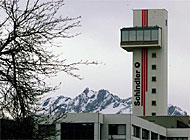Central Swiss cantons join forces for economic promotion

They do things differently in central Switzerland when it comes to economic promotion.
While most other cantons handle their own economic promotion, the inner Swiss cantons have been working together.
Business Promotion Central Switzerland (BPCS), based in Lucerne, is a private agency that was set up by the cantons of Lucerne, Uri, Schwyz, Obwalden and Nidwalden in 1996.
The director of BPCS, Josef Wechsler, told swissinfo that there was a tradition within the central Swiss cantons of working together in different fields including education, environment, tourism, transport and infrastructure.
“Then came the recession of the nineties, as well as the increased competition in a globalized world between regions in Switzerland, in Europe and other parts of the world,” explained Wechsler. “This forced central Switzerland to market its region more proactively as a business location.”
Through pooling their marketing effort, the central Swiss cantons are certainly in a better position to compete with the big urban cantons such as Zurich, Bern, Basel and Geneva.
The image of central Switzerland may be one of idyllic Alpine pastures but in fact agriculture accounts for only about seven per cent of the full time jobs in the region.
The service sector is less developed than in the rest of Switzerland, with only 56 per cent of the workforce active in this area compared to the national average of 62 per cent.
The most important industry, in terms of the number of people it employs, is the mechanical engineering industry with more than 11,000 jobs. The biggest employer in the region is Schindler Elevators.
“Historically, the variety of companies in the region reflects the diversity of the central Swiss economy which is rather dominated by small and medium-sized enterprises,” added Wechsler.
In the past, the central Swiss region has been handicapped by its picturesque location, with visitors thinking this was too nice a place in which to do business.
However, that image has changed, according to Wechsler, who highlighted the good transport connections through the region as a plus for business.
He also highlighted the region’s proximity to large business centres, the low level of taxation and the flexible labour market as other factors attracting new business to central Switzerland.
“A factor of importance is also that the authorities are open and act in an unbureaucratic manner when dealing with companies and investors,” said Wechsler.
There are many examples of businesses agreeing with the BPCS. United States cosmetic giant Estée Lauder moved to the region in 1978 and said in a statement that the “stable political environment, favourable tax conditions and motivated highly qualified employees” all contributed to it remaining there.
Elsewhere, Aart Brouwer, vice president of Amgen (Europe) said that his employees benefited from the international environment but without being in a big city.
BPCS has a very specific role to promote the region to prospective investors and then handing over companies to the canton responsible when a location decision has been made.
Wechsler admitted that competition between the central Swiss cantons can be heated but the process is open and transparent.
“We are mainly interested in high value adding companies in the micro, medical technology and in the IT and service sector, including corporate services of multinational companies,” said Wechsler.
The services offered by BPCS are much the same as other economic promotion offices in Switzerland. The agency offers help in finding offices, obtaining work permits, recruitment and tax planning.
“Since 1997, 60 companies settled down in central Switzerland, which means about 600 jobs created and with a potential which is higher than that,” explained Wechsler. “On average one company a month is settling down in the region through our efforts.”
Central Switzerland’s cantons may be small but by pooling their resources they account for a region with a population of 600,000 with a per capita income of SFr40,000 ($22,560). The per capita national average is SFr43,000.
With one business a month moving into the region, the BPCS is also doing its part in keeping the economy of the region in an expansive mood.
by Tom O’Brien

In compliance with the JTI standards
More: SWI swissinfo.ch certified by the Journalism Trust Initiative









You can find an overview of ongoing debates with our journalists here . Please join us!
If you want to start a conversation about a topic raised in this article or want to report factual errors, email us at english@swissinfo.ch.